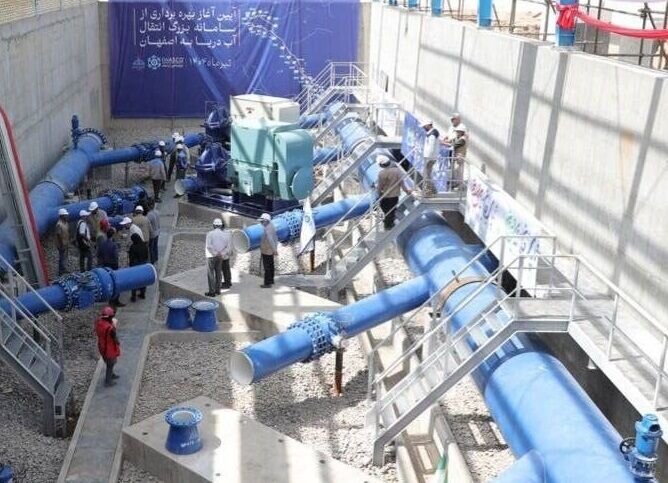Isfahan refinery begins using seawater, secures 700,000 cubic meters monthly

TEHRAN – Isfahan Oil Refining Company has launched the pilot operation of the first phase of a major seawater transfer project, aiming to supply around 700,000 cubic meters of water each month to the refinery, its head announced.
Gholamreza Bagheri-Dizaj told Shana that the project is among the refinery’s most strategic initiatives, launched to ensure a stable water supply for Isfahan’s key industries amid worsening drought conditions.
The plan involves transferring seawater from the Gulf of Oman to central Iran through an extensive pipeline network.
“Given Isfahan’s geographic vulnerability and frequent droughts, securing industrial water has long been a priority. With the formation of a dedicated water transfer company and investment by major regional industries, tapping sustainable sources like the Oman Sea has become possible,” he said.
The project is being implemented in two phases. The first phase, now in trial operation, delivers water through a 339-kilometer pipeline branching from the main VASCO line.
The pipeline splits into two routes—240 kilometers to the north and 219 kilometers to the south. The northern route feeds the Isfahan refinery.
Bagheri-Dizaj said Isfahan Refinery is the first industrial facility in the province to utilize seawater, marking a critical step in reducing reliance on increasingly scarce freshwater resources. “This project directly addresses one of the region’s biggest challenges—water shortages—and offers a scalable solution for industrial use,” he said.
He emphasized that the project adheres to environmental standards. Pumping stations have already been installed and are in pilot operation. He added that, alongside the seawater initiative, efforts continue to maximize water recycling, treat wastewater, and implement conservation programs.
“Using seawater is a reliable and strategic alternative that reduces dependence on urban water supplies, helping stabilize industrial and refining operations,” Bagheri-Dizaj noted.
The second phase of the project will involve the construction of approximately 400 kilometers of new pipelines and related infrastructure to directly transport water from the Gulf of Oman. Design work is complete, and execution will begin once funding is secured.
EF/MA
Leave a Comment